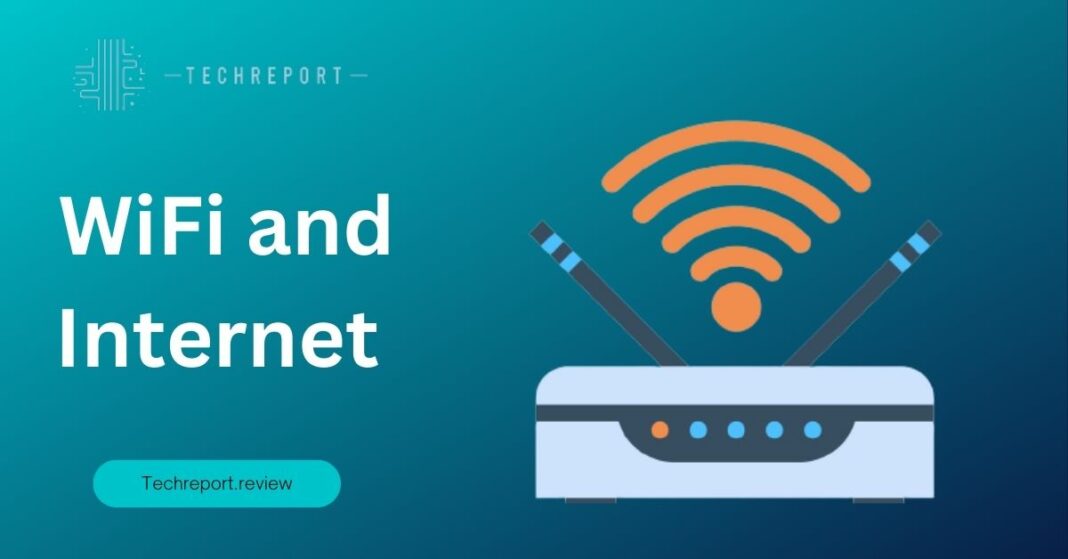In today’s world, the terms WiFi and internet are often used interchangeably, but they are not the same thing. While both are essential components of modern-day communication and information technology, it’s important to understand the differences between the two. In this blog, we will define WiFi and the internet and explain why it’s important to understand the differences between them.
WiFi, short for Wireless Fidelity, is a wireless networking technology that allows devices to connect to the internet without the need for cables or wires. It uses radio waves to transmit data between devices, such as a computer or smartphone, and a wireless router. The router acts as an access point, allowing multiple devices to connect to the internet simultaneously. WiFi is commonly used in homes, offices, cafes, and other public places.
On the other hand, the Internet is a global network of interconnected computers and servers that communicate with each other using standard protocols. It allows users to access a wide range of services and information, including websites, email, social media, online shopping, and more. The Internet is the backbone of the digital age and is an essential tool for communication, education, entertainment, and commerce.
Understanding the differences between WiFi and the Internet is crucial because they serve different purposes and have different capabilities. While WiFi allows devices to connect to the internet wirelessly, it is not the same thing as the internet itself. This distinction is important when troubleshooting connection issues, comparing internet service providers, or choosing between different types of wireless technology.
In the following sections, we will explore the differences between WiFi and the Internet in more detail and answer some common questions related to these technologies.
What is WiFi and how does it work?
Wireless Fidelity, commonly known as WiFi, is a wireless networking technology that allows devices to connect to the internet and communicate with each other without the need for physical cables. WiFi works by using radio waves to transmit data between devices, allowing for seamless wireless communication.
In a WiFi network, a wireless router or access point acts as a central hub that connects to the internet via a modem and wirelessly broadcasts a signal that can be picked up by nearby devices. This signal is typically transmitted over a specific frequency band, such as 2.4 GHz or 5 GHz, and can be secured using a password or other authentication method to prevent unauthorized access.
Routers and access points can vary in terms of their range and signal strength, with some models capable of covering large areas or multiple floors of a building. In addition, WiFi networks can also be extended using additional access points or range extenders, which act as relay points for the signal.
Compared to cellular data networks, WiFi typically offers faster speeds and lower latency, making it well-suited for applications such as streaming video, online gaming, and other bandwidth-intensive activities. However, WiFi networks can also be susceptible to interference from other wireless signals, and their performance can be affected by factors such as distance from the router, signal strength, and the number of devices connected to the network.
What is the Internet and how does it work?
The internet is a global network of interconnected computer networks that communicate with each other using standardized communication protocols. It allows computers, servers, and other devices to share information and communicate with each other across great distances. The Internet is a vast and complex system that connects people and machines across the globe.
The internet works by transmitting data from one device to another using a variety of communication protocols. Data is transmitted through a series of routers and switches that help direct traffic across the internet. Internet service providers (ISPs) play a crucial role in establishing an Internet connection by providing users with access to the Internet.
An internet connection is established through the use of a modem, which connects a user’s computer or other device to their ISP’s network. The modem converts the data transmitted over the internet into a form that can be used by the device, such as an email or a web page. This data is then transmitted through a series of routers and switches until it reaches its destination.
The Internet and WiFi are often used interchangeably, but they are not the same thing. WiFi is a wireless networking technology that uses radio waves to provide a high-speed internet connection within a limited range. The internet, on the other hand, is a vast network of networks that allows for global communication and the sharing of information across vast distances. WiFi is a way to access the Internet, but it is not the Internet itself.
How WiFi and the Internet work together
WiFi and the internet are two different technologies that work together to provide access to online services and content. WiFi allows users to connect to the internet wirelessly, while the internet provides access to a vast network of servers and content providers.
When a user connects to a WiFi network, their device communicates with a router or access point that broadcasts a wireless signal. This signal allows the device to connect to the WiFi network and access the internet through the router or access point. The router or access point serves as a bridge between the user’s device and the internet service provider (ISP), which provides the internet connection.
The ISP is responsible for establishing and maintaining the internet connection. They use a variety of technologies, such as fiber optic cables, copper wires, or satellite transmissions, to deliver internet connectivity to homes and businesses. Once the internet connection is established, users can access a wide range of online services and content, such as email, social media, streaming video, and more.
The benefits of using WiFi to access the internet are numerous. WiFi networks are convenient, allowing users to access the internet from anywhere within range of the wireless signal. They are also typically faster than cellular data connections, making it easier to stream video or download large files. WiFi networks can also be more secure than cellular data, as they can be encrypted and require passwords for access.
Overall, WiFi and the internet work together to provide users with a powerful and convenient way to access online services and content. By understanding the relationship between the two technologies, users can make informed decisions about how to connect to the internet and which devices to use for different tasks.
Benefits of using WiFi over the Internet
When it comes to accessing the internet, WiFi has become a popular choice for many people. There are several benefits of using WiFi over a traditional wired internet connection, and we will discuss some of them below.
- Flexibility and Mobility:
One of the main benefits of using WiFi is the flexibility and mobility it provides. With WiFi, you can access the internet from anywhere within the range of the network. This means you can move around your home or office while staying connected to the internet on your laptop, smartphone, or tablet.
- Higher Bandwidth and Faster Speeds:
WiFi networks can provide higher bandwidth and faster speeds compared to traditional wired connections. This means you can stream high-definition videos, download large files, and browse the web without experiencing any lag or buffering issues. Moreover, the latest WiFi technology, such as WiFi 6 or 802.11ax, can deliver even faster speeds and better performance.
- Cost-Effectiveness and Convenience:
Using WiFi to access the internet can be a cost-effective and convenient option. You do not need to pay for a separate internet connection for each device, as you can connect multiple devices to the same WiFi network. Additionally, setting up a WiFi network is relatively easy and can be done without professional help.
- Multiple Device Connectivity:
Another benefit of using WiFi is the ability to connect multiple devices to the same network simultaneously. This means you can have your laptop, smartphone, tablet, and other devices connected to the same network without needing separate internet connections for each device. This can be particularly useful for families or small businesses where multiple people need to access the internet at the same time.
In conclusion, using WiFi to access the internet provides several benefits, including flexibility, higher bandwidth, faster speeds, cost-effectiveness, and multiple device connectivity. With the advancements in WiFi technology, the performance and capabilities of WiFi networks are constantly improving, making it an increasingly popular choice for internet users.
Disadvantages of using WiFi over the Internet
While using WiFi to connect to the internet has many benefits, it also has some downsides that users should be aware of. These include:
- Limited range and signal strength: WiFi signals have a limited range, and the strength of the signal can be affected by obstacles such as walls and floors. This means that if you are too far away from your router or access point, or if there are too many obstacles between you and the router, your WiFi signal may be weak or non-existent.
- Security concerns: WiFi networks can be vulnerable to security breaches, such as hacking and unauthorized access. It is important to secure your WiFi network with a strong password and encryption to prevent unauthorized access and protect your personal information.
- Interference from other devices: WiFi signals can be affected by other devices that use the same frequency band, such as cordless phones and Bluetooth devices. This interference can cause signal drops and slow down your WiFi connection.
- Dependence on power source: WiFi networks require a power source to function. If the power goes out or your router loses power, you will not be able to access the internet through your WiFi network.
It is important to consider these disadvantages when choosing between using WiFi or a wired internet connection. If you require a more reliable and secure internet connection, a wired connection may be a better option for you.
In Crux
In conclusion, both WiFi and the Internet are essential for connecting to the digital world. While WiFi and the internet are often used interchangeably, they serve different purposes and offer distinct benefits and drawbacks.
WiFi is a wireless networking technology that enables devices to connect to the internet without the need for physical wires. WiFi offers flexibility, mobility, higher bandwidth, faster speeds, and multiple-device connectivity. However, it has limitations in terms of range, signal strength, security concerns, interference from other devices, and dependence on a power source.
The internet, on the other hand, is a global network of interconnected devices that allows users to access and share information across the world. The internet is typically provided by an ISP, and it offers reliable connectivity, global reach, and high-speed data transfer. However, it requires physical connections, can be costly, and may not be as flexible as WiFi.
Determining which is better, WiFi or the internet depends on individual needs and circumstances. For those who require mobility and flexibility, WiFi is the preferred option. For those who need a reliable and fast internet connection with global reach, the internet is the better option.
In general, it is recommended to use WiFi for home and personal use and the internet for businesses and work-related activities. It is also important to prioritize security when using either option to protect against cyber threats and unauthorized access.
How much did you like our detailed The Clash of Connectivity: WiFi and Internet? Also, please share these Blogs with your friends on social media.
Related Blogs
- Is iPhone 14 Worth the Hype
- Unblock Banned Apps
- Best Cheap VPN Services
- Antenna vs Cable TV
- TiVo or DVR
[WPSM_AC id=1201]

























